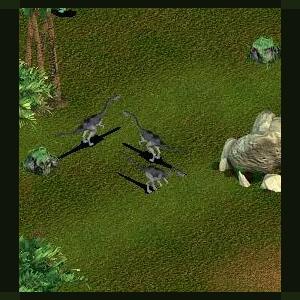About This File
Ornitholestes
Ornitholestes ("bird robber") was a small theropod dinosaur of the late Jurassic of Western Laurasia (the area that was to become North America). Almost everything known of this species comes from a single skeleton of Ornitholestes, found near Como Bluff in 1900, and described by Henry Fairfield Osborn in 1903. A hand was later attributed to Ornitholestes, although this attribution is now in doubt. The species name honours the AMNH preparator Adam Hermann.
Ornitholestes was roughly 2 meters (6.5 ft) in length. The head of Ornitholestes was relatively small. Nonetheless, the skull was more robust than that of many other small theropods, such as Compsognathus and Coelophysis, and this would have enabled Ornitholestes to deliver a powerful bite.
Gregory S. Paul suggested the presence of a small horn on the snout of Ornitholestes, similar to that of Proceratosaurus. however this has recently been disproved by Carpenter et al., which indicated that the 'crest' was actually a broken nasal bone. Like most other theropods, Ornitholestes had a long tail, presumably used for balance
Ornitholestes was a coelurosaur, similar in many ways to Compsognathus, though somewhat larger.
The sharp teeth of Ornitholestes clearly identify it as a carnivore, but its exact diet has been a subject of debate in the paleontological community.
In his original 1903 description, Henry Fairfield Osborn suggested that Ornitholestes might have preyed on contemporary birds, based on the "rapid grasping power of agile and delicate prey" suggested by the structure of the hand. In 1917, however, Osborn reevaluated the hand and determined that it was unsuitable for this purpose.
More recently, Robert T. Bakker speculated that Ornitholestes probably hunted small mammals, noting that "the Como furballs were just the right size to fit the predator's jaws."



Recommended Comments
There are no comments to display.
Create an account or sign in to comment
You need to be a member in order to leave a comment
Create an account
Sign up for a new account in our community. It's easy!
Register a new accountSign in
Already have an account? Sign in here.
Sign In Now